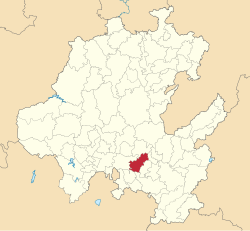Pachuca (municipality)
| Pachuca | ||
|---|---|---|
| Municipality | ||
|
||
 |
||
| Country | Mexico | |
| State | Hidalgo | |
| Municipal seat | Pachuca de Soto | |
| Government | ||
| • Municipal president | Eleazar García Sánchez | |
| Population | ||
| • Total | 267 862 | |
| Time zone | CST (UTC-6) | |
| • Summer (DST) | CDT (UTC-5) | |
The Municipality of Pachuca de Soto, or Municipality of Pachuca, is one of the Municipalities of the state of Hidalgo, located in east-central Mexico.
The municipal seat is the City of Pachuca (Ciudad de Pachuca de Soto). The Municipality of Pachuca is increasingly co-extensive with the metropolitan area of Pachuca, as development grows to cover over 60% of the geographic open space. This has eliminated much of the municipality’s native flora diversity and larger fauna.
The location of the municipality is north of the state of Mexico, and is located in the low extreme geographical coordinates of Greenwich, north latitude 20º01'23", 20º12'28" maximum, west longitude 98°41'30" minimum, 98°52'35" maximum. The Municipality of Pachuca has a territory of 195,300 square kilometres (75,400 sq mi) and borders the municipalities of Mineral del Chico, Mineral del Monte, Zempoala, Zapotlán de Juárez, Mineral de la Reforma, Epazoyucan, and San Agustín Tlaxiaca.
The municipality is located in rugged hill and mountain terrains, and varies in altitude between 2,400–2,800 metres (7,900–9,200 ft) above sea level. It is located on the Trans-Mexican Volcanic Belt (Eje Volcánico Transversal, Sierra Nevada) mountain ranges system. The only major level terrain is where the historic center of Pachuca city is located. Notable mountains are the Cerro del Cuixi, the Cerro de San Cristóbal, and the Cerro de Cubitos.
Rivers that cross through the municipality are the Actopan, the Amajac and the Tezontepec Rivers. The climate is temperate and relatively cold with strong winds during eight to nine months out of the year. These can reach speeds of 60–65 km an hour.
64% of the Municipality of Pachuca is a developed urban area. Agriculture is nearly a non-existent factor in the economy, as the small-scale farming and livestock raising in the hills is for family or local consumption.
Despite its decline in the 20th century, mining still continues to be an important element of Pachuca’s economy. Pachuca still produces more than 60% of the state’s gold and more than 50% of its silver.
...
Wikipedia

